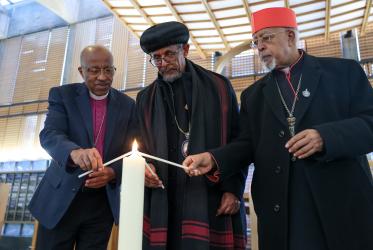“A single stick may smoke, but it will not burn.”
Ethiopian proverb
From the face value, the above African proverb means that it actually takes a collection of sticks to have a burning fire since a single stick can only produce a thread of wispy smoke. The same is actually true with regards to our life. It is common to hear statements like ‘let us keep the fire burning’ when initiatives are started, but, most times it is just that, statements because individualism often supersedes collectivism. Little is done to fan the fire and add wood to it to ensure that it actually keeps burning.
Ecumenism, which refers to the effort by Christians from different church traditions to establish closer relationships and better understanding, has been the key focus of many churches in the quest for visible unity. Though Christians are unique in their traditions, their respective denominations and ways of worship, they are founded on a foundation of unity in Christ. This is evident in common beliefs such as the supremacy of the Bible, the common calling to the glory of the one God: Father, Son and Holy Spirit, and the core agenda of mission and evangelism.
The World Council of Churches, a worldwide fellowship of churches, play a key role in Ecumenism as it has brought together people from different denominational affiliations in a spirit of fellowship. It aims towards unity in one faith and one Eucharistic fellowship, expressed in worship and in common life in Christ. The unity was seen in the recent Conference on World Mission and Evangelism (CWME) held in Arusha, Tanzania, where over 1,000 delegates were guided by the theme: “Moving in the Spirit: Called to Transforming Discipleship.”
The conference emphasized transformative, all-inclusive and effective mission and evangelism. Thomas Jefferson has been quoted saying, “If you want something you've never had, you must be willing to do something you've never done.” A visit to different churches in Arusha and Moshi on 11 March 2018 by some of the participants of the CWME brought out interesting discoveries, which point out to the fact that mission and evangelism has evolved.
Mission is no longer only the dissemination of religious content but also practical witnessing in the people’s context. The churches are active around themes of education, health, charity work, environmental advocacy and social justice advocacy. They are involved in activities such as schools and health facilities sponsorship, organization of compassion programmes, community service and organizing forums to speak out against social injustices. Through the youth, evangelism has incorporated the use of creative activities such as drama, music and artistic expression which sends out a clear message that mission is not only for the old but for the young as well.
The situation among the local churches reflect the oneness in Christ and the embrace of the spirit of ecumenism. This was portrayed by the warm hospitality accorded to the guests from the CWME by the local congregations. Messages on respecting our diversity and uniqueness were also central in the sermons. Rev. Dr Olav Fykse Tveit, the WCC general secretary quoted in his sermon that “We are all God’s creation made in His image. Diversity is a gift from God to us. We have a duty to take care of God’s creation together.” A choir leader while welcoming the visitors to an African worship experience in Christ Church Cathedral, Arusha, also said “Even if you do not understand Swahili, you can still enjoy a Tanzania dance.”
As Christians we are called to establish relations and build consensus to be able to achieve one of the main goals of ecumenism, which is to establish greater unity and cooperation among the various Christian traditions. I echo the words of Paul the apostle in Romans 12:5 “so in Christ we, though many, form one body, and each member belongs to all the others.”






